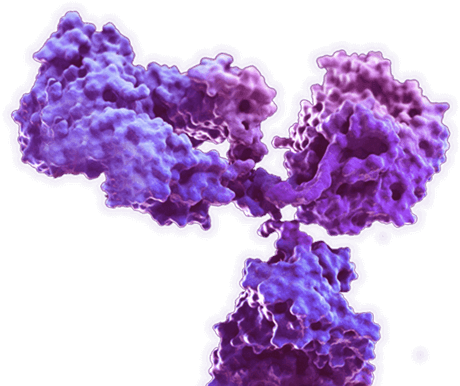Mouse Anti-MSH2 Antibody (CBMOAB-36731FYC)
Cat: CBMOAB-36731FYC
Certificate of Analysis Lookup
To download a Certificate of Analysis, please enter a lot number in the search box below. Note: Certificate of Analysis not available for kit components.
Lot Number
To download a Certificate of Analysis, please enter a lot number in the search box below. Note: Certificate of Analysis not available for kit components.
Lot Number
- Product List
- Specifications
- Application Information
- Target
- Reference
| Sub Cat | Clonality | Species Reactivity | Application | Clone | Conjugate | Size | |
| CBMOAB-36731FYC | Monoclonal | A. thaliana (Arabidopsis thaliana), C. elegans (Caenorhabditis elegans), Cattle (Bos taurus), Chimpanzee (Pan troglodytes), Frog (Xenopus laevis), Marmoset, Pig (Sus scrofa), Rhesus (Macaca mulatta), Tomato (Lycopersicon esculentum) | WB, ELISA | MO36731FC | 100 µg | ||
| CBMOAB-51810FYA | Monoclonal | Rhesus (Macaca mulatta) | WB, ELISA | MO51810FYA | 100 µg | ||
| CBMOAB-06872HCB | Monoclonal | C. elegans (Caenorhabditis elegans) | WB, ELISA | MO06872HB | 100 µg | ||
| MO-AB-14354W | Monoclonal | Chimpanzee (Pan troglodytes) | WB, ELISA | MO14354W | 100 µg | ||
| MO-AB-59420W | Monoclonal | Marmoset | WB, ELISA | MO59420W | 100 µg | ||
| MO-AB-16094R | Monoclonal | Cattle (Bos taurus) | WB, ELISA | MO16094R | 100 µg | ||
| MO-AB-27367R | Monoclonal | Pig (Sus scrofa) | WB, ELISA | MO27367R | 100 µg | ||
| MO-AB-05336H | Monoclonal | Frog (Xenopus laevis) | WB, ELISA | MO05336C | 100 µg | ||
| MO-AB-34923H | Monoclonal | Tomato (Lycopersicon esculentum) | WB, ELISA | MO34923C | 100 µg |
Specifications
| Host species | Mouse (Mus musculus) |
| Species Reactivity | A. thaliana (Arabidopsis thaliana), C. elegans (Caenorhabditis elegans), Cattle (Bos taurus), Chimpanzee (Pan troglodytes), Frog (Xenopus laevis), Marmoset, Pig (Sus scrofa), Rhesus (Macaca mulatta), Tomato (Lycopersicon esculentum) |
| Clone | MO36731FC |
| Specificity | This antibody binds to Arabidopsis MSH2. |
| Format | Liquid or Lyophilized |
| Storage | Store at 4°C: short-term (1-2weeks) Store at -20°C: long-term and future use |
| Purity | > 90% was determined by SDS-PAGE |
| Purification | Purified with Protein A or G affinity chromatography |
| Cellular Localization | Nucleus; Plasma Membrane; Other locations |
Application Information
| Application | WB, ELISA |
| Application Notes | ELISA: 1:1000-1:3000 Other applications are to be developed. The optimal dilution should be determined by the end user. |
Target
| Introduction | This locus is frequently mutated in hereditary nonpolyposis colon cancer (HNPCC). When cloned, it was discovered to be a human homolog of the E. coli mismatch repair gene mutS, consistent with the characteristic alterations in microsatellite sequences (RER+ phenotype) found in HNPCC. Two transcript variants encoding different isoforms have been found for this gene. |
| Product Overview | Mouse Anti-Arabidopsis MSH2 Antibody is a mouse antibody against MSH2. It can be used for MSH2 detection in Western Blot, Enzyme-Linked Immunosorbent Assay. |
| Alternative Names | MutS Homolog 2; HMSH2; MutS (E. Coli) Homolog 2 (Colon Cancer, Nonpolyposis Type 1); MutS Homolog 2, Colon Cancer, Nonpolyposis Type 1 (E. Coli); MutS Homolog 2, Colon Cancer, Nonpolyposis Type 1; DNA Mismatch Repair Protein Msh2; MutS Protein Homolog 2 |
| UniProt ID | O24617 |
| Protein Refseq | The length of the protein is 937 amino acids long. The sequence is show below: MEGNFEEQNKLPELKLDAKQAQGFLSFYKTLPNDTRAVRFFDRKDYYTAHGENSVFIAKTYYHTTTALRQLGSGSNALSSVSISRNMFETIARDLLLERNDHTVELYEGSGSNWRLVKTGSPGNIGSFEDVLFANNEMQDTPVVVSIFPSFHDGRCVIGMAYVDLTRRVLGLAEFLDDSRFTNLESSLIALGAKECIFPAESGKSNECKSLYDSLERCAVMITERKKHEFKGRDLDSDLKRLVKGNIEPVRDLVSGFDLATPALGALLSFSELLSNEDNYGNFTIRRYDIGGFMRLDSAAMRALNVMESKTDANKNFSLFGLMNRTCTAGMGKRLLHMWLKQPLVDLNEIKTRLDIVQCFVEEAGLRQDLRQHLKRISDVERLLRSLERRRGGLQHIIKLYQSTIRLPFIKTAMQQYTGEFASLISERYLKKLEALSDQDHLGKFIDLVECSVDLDQLENGEYMISSSYDTKLASLKDQKELLEQQIHELHKKTAIELDLQVDKALKLDKAAQFGHVFRITKKEEPKIRKKLTTQFIVLETRKDGVKFTNTKLKKLGDQYQSVVDDYRSCQKELVDRVVETVTSFSEVFEDLAGLLSEMDVLLSFADLAASCPTPYCRPEITSSDAGDIVLEGSRHPCVEAQDWVNFIPNDCRLMRGKSWFQIVTGPNMGGKSTFIRQVGVIVLMAQVGSFVPCDKASISIRDCIFARVGAGDCQLRGVSTFMQEMLETASILKGASDKSLIIIDELGRGTSTYDGFGLAWAICEHLVQVKRAPTLFATHFHELTALAQANSEVSGNTVGVANFHVSAHIDTESRKLTMLYKVEPGACDQSFGIHVAEFANFPESVVALAREKAAELEDFSPSSMIINNEESGKRKSREDDPDEVSRGAERAHKFLKEFAAIPLDKMELKDSLQRVREMKDELEKDAADCHWLRQFL. |
Reference
| Reference | Molinier, J., Ramos, C., Fritsch, O., & Hohn, B. (2004). CENTRIN2 modulates homologous recombination and nucleotide excision repair in Arabidopsis. The Plant Cell, 16(6), 1633-1643. |
See other products for " msh2 "
| CBMOAB-87524FYA | Mouse Anti-msh2 Antibody (CBMOAB-87524FYA) |
| CBMOAB-02457CR | Mouse Anti-MSH2 Antibody (CBMOAB-02457CR) |
For Research Use Only | Not For Clinical Use.
Online Inquiry

